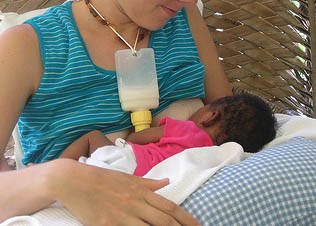At what age do the baby’s first teeth come out?
The age at which the first tooth can appear is highly variable, let us always remember that each child grows and develops at their own pace and the appearance of teeth is no exception.
Usually the first teeth begin to emerge between 6 and 12 months , with the lower central incisors being the ones that usually appear at the beginning, followed by the upper central incisors.
There are babies whose teeth begin to appear earlier, in some cases they are even born with them . There is also the possibility that they will start to appear until after the year.
Regularly for the three years is when all the teeth finish coming out .
Signs that indicate the appearance of the first teeth

One of the first signs that your little one’s teeth are about to erupt is an increase in salivation . You will find yourself using more bibs or wipes than usual. It is important to have enough on hand to avoid getting your baby’s clothes wet.
We may notice swelling and a little redness in the gums , which will make the baby more restless and feel the urge to bite whatever is within reach. This can make you feel more irritable , although there are children who seem completely unaffected by tooth sprouting.
According to the Spanish Association of Pediatrics, if the child develops a fever or feels sick or down, we must take him to the pediatrician . Although it is believed that the eruption of the teeth causes fever, diarrhea or some digestive problem, this is only a myth and they are not symptoms caused by the eruption of the teeth .
If you are concerned that your baby will hurt his teeth, you can be calm or calm. There is no scientific argument to support this belief, and although babies do not feel pain, they can present some discomfort .
How to help you avoid teething discomfort
A common question among parents, How to sooth a teething baby? Teething discomforts are usually nothing more than that, a simple annoyance. But we can help make the process easier.
You can offer him a teether , which you have preferably previously chilled, leaving it in the fridge for a few hours. If your child already eats solid foods, you can offer fresh food or cold drinks as well .
You can also help reduce discomfort by gently massaging the gums with your finger or a cold teaspoon.
Let babies bite as much as they want , always trying not to leave dangerous objects within their reach or with which they can present the risk of suffocation.
If the discomfort becomes very strong, you can consult your pediatrician to indicate a pediatric analgesic according to their age.
How was the process of the appearance of your baby’s teeth?




